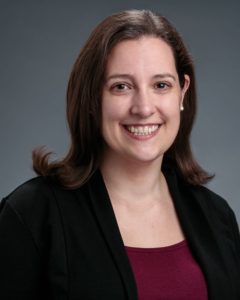 Rachel received her Ph.D. from UC Berkeley in Allen Goldstein’s group and then carried out two postdocs, one at Lawrence Berkeley National Lab and the other at MIT. She started a faculty position in the Chemistry department at William & Mary in 2017 where she is now entering her fifth year. Her research focuses on complex organic mixtures found in aerosol particles and on indoor and outdoor surfaces. With a team of undergraduates and masters’ students, she probes details on the chemical composition and investigates how the mixtures change as they age under natural conditions. Collaborations are a key component of her research, and she is so happy to have had the opportunity to take part in the HOMEChem field campaign to investigate questions in indoor chemistry.
Rachel received her Ph.D. from UC Berkeley in Allen Goldstein’s group and then carried out two postdocs, one at Lawrence Berkeley National Lab and the other at MIT. She started a faculty position in the Chemistry department at William & Mary in 2017 where she is now entering her fifth year. Her research focuses on complex organic mixtures found in aerosol particles and on indoor and outdoor surfaces. With a team of undergraduates and masters’ students, she probes details on the chemical composition and investigates how the mixtures change as they age under natural conditions. Collaborations are a key component of her research, and she is so happy to have had the opportunity to take part in the HOMEChem field campaign to investigate questions in indoor chemistry.
Read Rachel O’Brien’s Emerging Investigator Series article “Chemical and Physical Properties of Organic Mixtures on Indoor Surfaces During HOMEChem” and read more about her in the interview below:
Your recent EmergingInvestigator Series paper focuses on Chemical and Physical Properties of Organic Mixtures on Indoor Surfaces During HOMEChem. How has your research evolved from your first article to this most recent article?
During my PhD, I explored the chemical composition of aerosol particles using soft ionization and ultra-high resolution mass spectrometry. In my first postdoc I worked on imaging individual aerosol particles using microspectroscopic techniques. During my second postdoc, I helped develop a method to atomize very small sample volumes into an Aerosol Mass Spectrometer. This most recent article is built on all these research skill sets. To fully understand the chemical composition and physical properties of complex mixtures like the ones we look at here, you need a range of different techniques. I’m so fortunate to have had the opportunity to combine my group’s main skill set (chemical analysis) with work from our collaborators to build a full picture of the chemical and physical properties of these indoor films.
What aspect of your work are you most excited about at the moment?
I’m really excited about the aging work that we are doing for complex organic mixtures from biomass burning, secondary organic aerosol, and indoor surface films. Our ability to track chemical changes over longer periods of time is providing some really interesting data sets.
In your opinion, what are the most important questions to be asked/answered in this field of research?
In indoor chemistry I think we really need to understand the chemical mixtures we have both in the surface films, but also in the air. In addition to that, we need to understand the variability that is present since no two houses or workplaces will be the same. With the Pandemic, many of us are spending more time indoors and this begs the questions: what are we breathing and what are we exposed to in these environments? Once we understand all this, we can better design aspects of the built environment, like ventilation and building materials, to improve our health and the quality of our daily life.
What do you find most challenging about your research?
The data sets we generate are complicated and can take long periods of time to analyze. As a pre-tenure faculty member, the slower pace for this can be a bit stressful. But the time we spend pays off in the detailed information we can generate.
In which upcoming conferences or events may our readers meet you?
I will be at AAAR this fall, and I’ll be attending AGU remotely.
How do you spend your spare time?
I don’t find that I have a lot of spare time, but what I do have I spend with my husband Jeremy. I hope to get back into swimming again once things open back up after the Pandemic.
Which profession would you choose if you were not a scientist?
If I weren’t a scientist, I would want to run a ranch focusing on beekeeping with lots of fields of different native flowers combined with wine fields.
Can you share one piece of career-related advice or wisdom with other early career scientists?
Find good people to work with: people who both encourage you and provide good feedback. Science is a great field to work in when you have a community of fantastic collaborators and mentors to share your journey.










